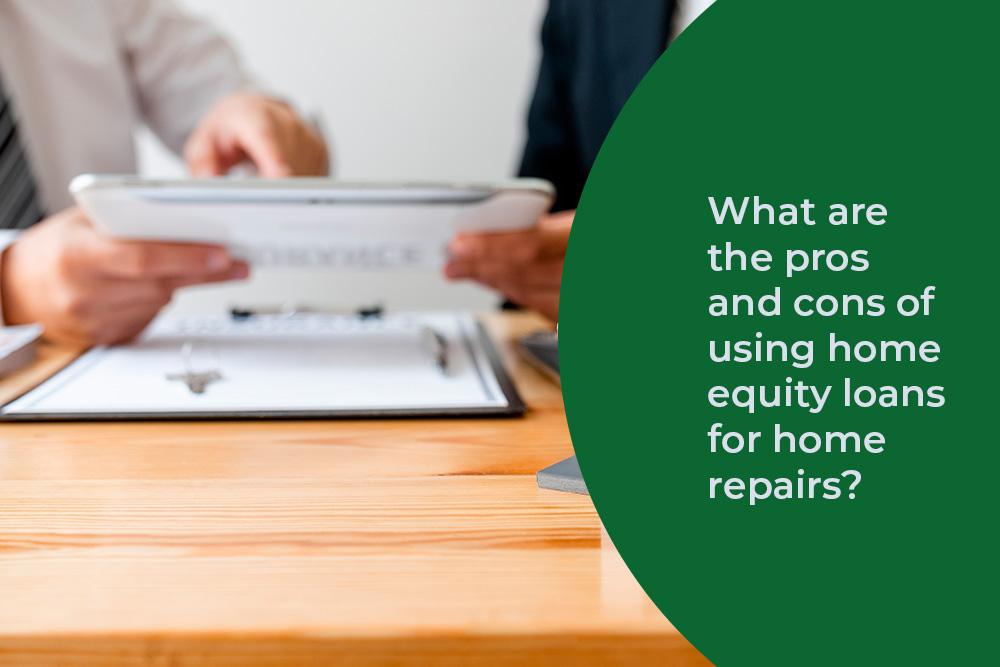
If you are planning a home renovation, you may be wondering how to finance the project. A home equity loan is one option, and it can be a great choice for making home improvements. A mortgage lender can explain the details and help you determine if financing home improvements with a home equity loan is right for you.
What is home equity?
The term “home equity” means the difference between your home’s value and how much you still owe to pay it off. Home equity can increase as your principal payments for home loans in Las Vegas decrease and the property’s value increases.
How can a home equity loan help with home renovations?

Some home loans in Las Vegas, including home equity loans, allow homeowners to make home renovations by supplying them with extra money to pay for renovations. If you use money from a home equity loan to cover the cost of home renovations, you will receive cash that you can use for various reasons, including home renovations and remodeling.
Using a home equity loan for home renovations is fairly straightforward. If you take out a home equity loan for home repairs, you will make a monthly payment covering the principal and interest, which is similar to a mortgage payment. One advantage of a home equity loan is that it has a fixed interest rate, so the interest rate on your monthly payments will not change over time. That makes it easy to predict how much money you’ll spend on mortgage rates in Las Vegas each month, which also helps with planning other parts of your monthly and yearly budget.
How does using a home equity loan work?
There are a few steps in the process of using a home equity loan for home repairs, but a mortgage lender can easily walk you through them. For starters, you’ll need to qualify for a home equity loan, just as you do for other kinds of loans. A lender will look at several criteria when determining whether or not a homeowner qualifies for a home equity loan, including credit score, equity, and debt-to-income ratio. If a mortgage lender determines that you qualify for the loan, they will then determine how much you qualify for by using a loan-to-value estimate.
What are the pros and cons of using home equity loans for home repairs?

When financing home renovations, there are potential advantages and drawbacks to consider before you go ahead with your plans. Here are some pros and cons to keep in mind.
Pros
Undertaking home repairs with a home equity loan can have many benefits, including:
- Longer terms
- Lower interest rates
- Predictable repayments
- ROI if you sell your home
- Easy to qualify for
- Funds are immediately available
- Interest can be deducted from income tax
Home equity loans are longer-term loans with a fixed interest rate, which gives them a predictable financial structure similar to a fixed-rate mortgage. However long the loan lasts, you can expect to make the same payments each month unless you pay off more than the minimum amount per month. If you sell your home, you may get a more significant return on investment (ROI) because home improvements increase the home’s value and make it more appealing to buyers. Home equity loans are also relatively easy to qualify for, and the funds are available almost immediately after you qualify for the loan. Finally, home equity loans are deductible from income taxes, which increases your budget.
Along with the advantages above, a home equity loan can allow you to make necessary home improvements in the first place, which in turn increases the home’s value. Ultimately, you can get more money for the home than you might have initially thought, and you may be able to sell the home faster if you plan to move.
Cons
Just as there are many advantages to getting home equity loans, there are some possible downsides to think about, too.
- Your home is collateral
- Risk of foreclosure
- Second mortgage
- Additional fees
- Decreased home value
One of the biggest disadvantages of using home equity as one of your home loans in Las Vegas is that you are using your home as collateral for the loan. That means you risk facing foreclosure on your home if you can no longer afford to keep up with your scheduled monthly payments. Even if you get good mortgage rates in Las Vegas for your home equity loan, you are still paying a second mortgage every month instead of just one. Compared to other types of home loans in Las Vegas, you may also find that there are some additional fees associated with a home equity loan, such as closing costs and other fees. While home equity can increase the value of your home, there’s also the chance that it can decrease your home’s value if you end up owing too much money on the house.
Using Home Equity Loans for Renovations

If you’re undertaking a home equity loan, you will want to make sure that you’re getting the most value from your loan and your home renovation project. One of the best ways to do that is to figure out if the home improvement project you’re considering starting will add value to the home. If you conclude that it will, the next step is to set a budget before taking out the loan and leave some extra finances for unexpected costs that might creep up.
How to Determine if a Renovation Adds Value
Before starting a home improvement project, consider whether it will add value if you choose to sell the home later. You can do many simple and smaller projects to increase your home’s value, such as upgrading the light fixtures or appliances, and those upgrades will add value to your home without costing a fortune. If you are hoping to build equity in your home, however, it might make more sense to undertake a larger project, such as remodeling the bathroom and kitchen or installing solar panels on the property. If you plan to live in your house for some time and might sell it later on, consider projects that will make you more comfortable and add value, such as installing new garage doors or floors.
Just as some home improvement projects add value to your property, others do not. Pools and hot tubs, which some people choose to add to their existing living space, do not always add value. Even if you enjoy using your pool or hot tub, subsequent homeowners may consider them to be too expensive and burdensome to maintain.
Another tip to think about when you’re planning home renovations is to consider unforeseen costs. If you own an older home, you may need to spend more on additional modifications to ensure your house is up to current building codes. Taxes, permitting fees, and delivery charges are some additional fees you may face.
Contact a loan officer to learn more about using home equity loans for renovations today.









